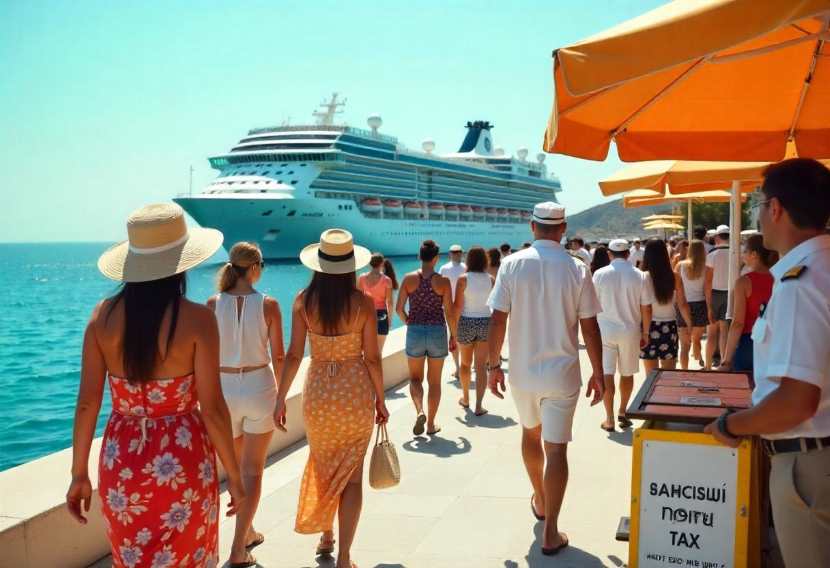≡-Greece Introduces Tourist Tax on Cruise Passengers To Address Overtourism: What You Need To Know – Viral of Today
<> Viral of Today <>
Home » EUROPE » Greece Introduces Tourist Tax on Cruise Passengers To Address Overtourism: What You Need To Know Tuesday, July 8, 2025Greece, a major holiday destination in Europe, is now taking new steps to deal with rising pressure from overtourism on its scenic islands. From July 2025, a tourist levy will be imposed on cruise visitors to the Greek islands, including popular attractions like Santorini and Mykonos. It’s part of a wider plan to tackle rising pressure from mass tourism, and specifically from cruise tourism, on infrastructure and local populations.Under the new regulation, cruise ships docking in the busiest destinations like Santorini and Mykonos will be charged EUR 20 (approximately USD 23.62) per passenger, while smaller islands will see a reduced rate of EUR 5 per passenger. The tax will be enforced annually during the peak tourism season, from June 1 to September 30, in an effort to manage the overwhelming flow of visitors during the summer months. The move is expected to generate up to EUR 50 million annually, which will be used to enhance local infrastructure, including the much-needed upgrades to the island’s ports and other tourist facilities.This new tax comes as part of a larger European trend to confront the negative impacts of overtourism. Cities such as Venice and regions like Barcelona and Ibiza have already introduced similar measures to curb the effects of overcrowding, pollution, and stress on local services. The decision by Greece to impose the tax reflects the country’s commitment to both preserving the authenticity of its islands and ensuring that local communities benefit sustainably from the tourism sector.Growing Concern Over the Impact of Cruise TourismGreece’s cruise industry has experienced significant growth in recent years, with passenger numbers rising by an impressive 13.2% in the last year alone, reaching 7.9 million visitors in 2024. This surge in cruise tourism has particularly affected highly visited islands like Santorini and Mykonos, each of which hosted more than 1.3 million visitors in 2024. While the influx of cruise passengers has undoubtedly boosted the country’s economy, it has also triggered significant concerns from residents and environmental groups.Local communities in Santorini and Mykonos have expressed frustration over the increasing strain on their infrastructure, including waste management systems, water supplies, and traffic congestion. Moreover, the environmental impacts of these massive cruise ships, such as pollution and damage to local ecosystems, have intensified calls for greater regulation of the industry. Residents are particularly vocal about the perceived disparity between the amount of time and money spent by cruise tourists compared to overnight guests, with the latter contributing more significantly to the local economy.Despite efforts by authorities to limit daily cruise arrivals, many islands continue to face the overwhelming burden of accommodating large numbers of tourists in a short period. These challenges, combined with the increasing pressure on resources, prompted Greece to introduce this new tourist tax as a way to manage the situation while simultaneously preserving the islands’ charm and ensuring that tourism remains a long-term benefit.The Economic Implications of the New TaxWhile the new tax is aimed at mitigating the negative consequences of cruise tourism, its introduction has sparked debates among various stakeholders. Some, including local port authorities, have voiced concerns that the tax could create unfair competition between islands that are subject to the new levy and those that are not. Smaller, less visited islands may feel the pinch of losing potential visitors due to the tax, leading to potential economic disparities within the Greek tourism sector.On the other hand, the cruise industry has defended its importance to the Greek economy, highlighting the EUR 2 billion in annual revenue generated by the sector. Industry representatives argue that cruise passengers contribute significantly to Greece’s tourism-driven economy, and they caution that the tax could negatively impact the growth of the industry, particularly as global competition for cruise tourists intensifies.At the same time, Greece’s tourism numbers overall have reached record levels, with the country hosting over 40.7 million visitors in 2024, marking an increase of 12.8% from the previous year. This success underscores the broader significance of the tourism sector in the national economy, but it also emphasizes the growing challenge of ensuring that tourism remains sustainable, especially on the country’s most sought-after islands.Balancing Economic Opportunity with SustainabilityAs Greece prepares for the introduction of the tourist tax in 2025, the challenge will be balancing the economic benefits of tourism with the long-term needs of local communities and the environment. The funds generated from the tax will be earmarked for improvements to island infrastructure, including the development of sustainable solutions to manage the demands of increased cruise arrivals. The goal is to improve the quality of life for residents, preserve the environment, and ensure that tourism contributes to a sustainable future for these beloved destinations.For now, Greece stands at a crossroads, with the task of protecting its islands’ cultural heritage while adapting to the realities of an increasingly globalized tourism industry. The tourist tax is just one part of a much larger conversation about how best to shape the future of travel in a way that benefits both local communities and the global tourism ecosystem.As other regions of the world experience similar issues in the upcoming years, Greece’s response to cruise tourism may become a model for other countries aiming to protect their environmental and cultural heritage while continuing to reap economic benefits afforded by tourism.
This information will surprise you!
See also
- Read until the end to discover everything.
- Important information you need to know.
- Interesting facts and helpful tips.
Conclusion
Did you enjoy the news? Keep following us daily!













